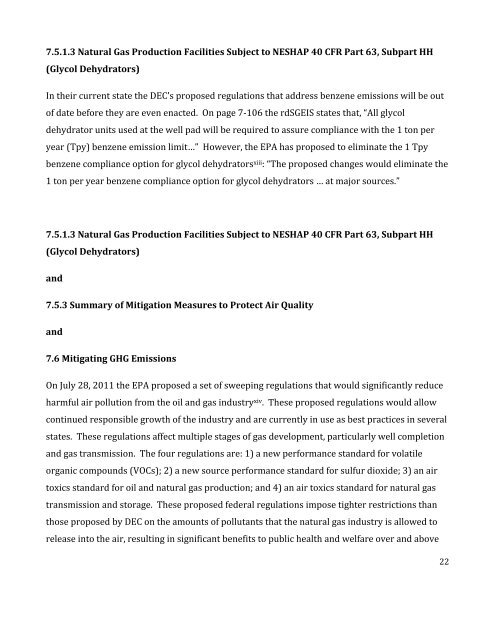file. - Otsego County Conservation Association
file. - Otsego County Conservation Association
file. - Otsego County Conservation Association
Create successful ePaper yourself
Turn your PDF publications into a flip-book with our unique Google optimized e-Paper software.
7.5.1.3 Natural Gas Production Facilities Subject to NESHAP 40 CFR Part 63, Subpart HH<br />
(Glycol Dehydrators)<br />
In their current state the DEC’s proposed regulations that address benzene emissions will be out<br />
of date before they are even enacted. On page 7-106 the rdSGEIS states that, “All glycol<br />
dehydrator units used at the well pad will be required to assure compliance with the 1 ton per<br />
year (Tpy) benzene emission limit…” However, the EPA has proposed to eliminate the 1 Tpy<br />
benzene compliance option for glycol dehydrators xiii : “The proposed changes would eliminate the<br />
1 ton per year benzene compliance option for glycol dehydrators … at major sources.”<br />
7.5.1.3 Natural Gas Production Facilities Subject to NESHAP 40 CFR Part 63, Subpart HH<br />
(Glycol Dehydrators)<br />
and<br />
7.5.3 Summary of Mitigation Measures to Protect Air Quality<br />
and<br />
7.6 Mitigating GHG Emissions<br />
On July 28, 2011 the EPA proposed a set of sweeping regulations that would significantly reduce<br />
harmful air pollution from the oil and gas industry xiv . These proposed regulations would allow<br />
continued responsible growth of the industry and are currently in use as best practices in several<br />
states. These regulations affect multiple stages of gas development, particularly well completion<br />
and gas transmission. The four regulations are: 1) a new performance standard for volatile<br />
organic compounds (VOCs); 2) a new source performance standard for sulfur dioxide; 3) an air<br />
toxics standard for oil and natural gas production; and 4) an air toxics standard for natural gas<br />
transmission and storage. These proposed federal regulations impose tighter restrictions than<br />
those proposed by DEC on the amounts of pollutants that the natural gas industry is allowed to<br />
release into the air, resulting in significant benefits to public health and welfare over and above<br />
22




